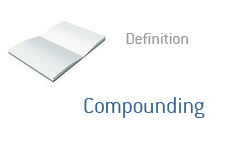Definition of Compounding
What is "compounding"? What is the definition of "compounding"? What does the term "compounding" mean?
Compounding occurs when your original investment PLUS any accrued gains earns even more gains.
For instance, let's say that you are investing $1,000,000 in a hedge fund. You have decided that you will reinvest any gains back into the fund.
In the first year, after fees, you end up earning 10% on your investment. This means that your original investment is now worth $1,100,000 ($1,000,000 original investment + $100,000).
 Now, let's say that in your second year at the fund, you end up earning 10% after fees once again. So, you would earn $100,000 again, right?
Now, let's say that in your second year at the fund, you end up earning 10% after fees once again. So, you would earn $100,000 again, right? No. This is where compounding comes in - don't forget that the 10% is calculated on $1,100,000, not your original investment of $1,000,000.
So, instead of earning $100,000 in your second year, you end up earning $110,000 (10% of $1,100,000).
If you continued to reinvest your gains, and if you continued to earn a 10% return each year, then you would progressively earn more and more every year thanks to the magic of compound interest.
Compound interest is the main reason why people should start investing at an early age.
--
Davemanuel.com Articles That Mention Compounding:
CDPQ, Canada's Second Largest Pension Fund, Likely Set To Lose Hundreds of Millions on Celsius Network Investment
General Motors, Chrysler Staring Bankruptcy in the Face After Bailout Falls Apart
